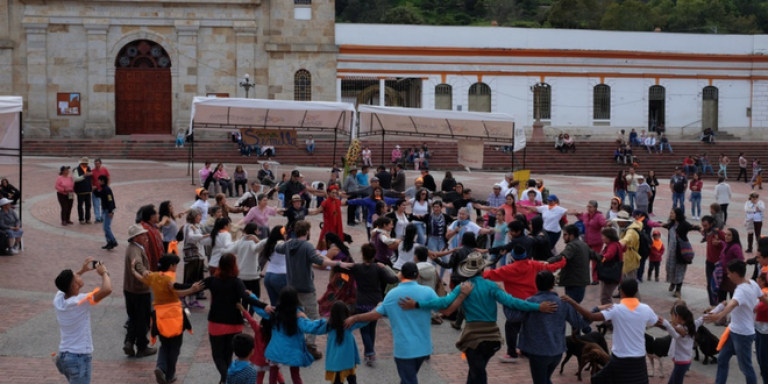What If...
22 January 2019
Our first blog from South America is from Danny Concha who takes Spanish and Latin American Studies and is working at E2E in Colombia for the year!

What if we moulded a micro-utopia with our hands… even for just one weekend? What if we built an immense bridge, which united both the city and the countryside in a deeply polarised society? What if we showcased the values and virtues of rural Colombia, without resorting to paternalism, romanticism or charity? What if we created something organic, sustainable and connected… instead of pursuing the same old artifice that we see each day?
“What if…”
These questions provided the backbone of an inspired weekend in Choachí, Cundinamarca. In this small town just outside Bogotá, 1,380 of us came together to celebrate the Carnival of Maize, Exchange and Forgiveness, in an event which not only questioned but provided answers to some of the crucial issues which continue to contaminate the world we live in; irresponsible consumerism, economic self-interest, exploitation and internal division.
The event? A coming-together of people from all walks of life, looking to create and participate in an alternative model of living. A carnival without a budget, without giant floats and without alcohol; a festival with a different purpose in mind…
It all kicked off on Saturday, with a celebration of one of the sacred pillars of the Pre-Colombian world; Maize. This Latin American life-force got the recognition it deserved in Choachí, with giant papier-mâché corns and a dedicated Maize Museum, showcasing all the varieties of maize that exist in Colombia today. In an age of Monsanto, monopoly and monoculture, homages to this iconic grain have become more important than ever. In the 1950s, there were over 6,000 varieties of maize in Colombia. Today, 480 remain.
The second aim of the event was to address that vital cog in Colombia’s ongoing process of nation-building; forgiveness. Why forgiveness? Because we are talking about a country that has experienced 159 years of war, and only 48 years of peace in its entire existence. Thanks to a series of lectures on the ‘Magic of forgiveness’, Choachí became a lesson in how to savour the present, without wincing from the venom of the past.
On Sunday, the main square was transformed into a mass trueque. For those who are unfamiliar with the term, a trueque is a hand-to-hand exchange of products, services, knowledge and ideas between two parties; an exercise in reciprocity, with the aim of creating meaningful relationships between ‘traders’. It represents a move away from commercialism, profit and consumerism, as no money is involved and products are valued in terms of use rather than cost.
An unwanted or disused bicycle is valued the same as a kilo of potatoes that could serve to make a soup…or a fistful of seeds, ready to sow. This year, chickens were traded for mobile phones, yoghurts were swapped for blenders and a young boy walked home grinning with his new Hot Wheels racing set, obtained in exchange for carrots and medicinal herbs. A man from Barranquilla exchanged his spare clothes for hugs.
The truth is that the commodities were merely an excuse. An excuse to get the City and the Country to talk to one another… a mutually-beneficial economy based on solidarity and cooperation, which served to connect people and form relationships. A series of beautiful interactions, based on nothing more than the simple dynamic of giving and receiving.
As the stalls emptied, the music softened and the performances drew to a close, each and every attendee was left asking the same questions:
“What if this magic were to become the norm? What if this event was about more than one municipality, in one country, for one weekend a year? What if this organic process became a model of how the City and the Countryside should interact? What if we made a collective effort to have more carnivals like the one we had in Choachí…”
“…What if?”
By Danny Concha
 Close
Close

